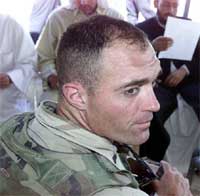Washington Post: “Two days before, a secret CIA-sponsored group of Iraqi paramilitaries, working with Army interrogators, had beaten Mowhoush nearly senseless, using fists, a club and a rubber hose, according to classified documents. The sleeping bag was the idea of a soldier who remembered how his older brother used to force him into one, and how scared and vulnerable it made him feel. Senior officers in charge of the facility near the Syrian border believed that such ‘claustrophobic techniques’ were approved ways to gain information from detainees, part of what military regulations refer to as a ‘fear up’ tactic, according to military court documents.”
Category / War
Ain’t No Room for Culture in the New I-Rack
The United States is now rivaling those who burned the Great Library of Alexandria as cultural destroyers. Having deliberately built a base upon Babylon, a new report from the British Museum notes:
- damage to the dragons decorating the Ishtar Gate, one of the world’s most famous monuments, from attempts to prise out the relief-moulded bricks
- broken bricks inscribed with the name of Nebuchadnezzar lying in spoil heaps
- the original brick surface of the great processional route through the gate crushed by military vehicles
- fuel seeping from tanks into archaeological layers
- acres of the site levelled, covered with imported gravel – which Dr Curtis said would be impossible to remove without causing further damage – and sprayed with chemicals which are also seeping into the unexcavated buried deposits
- thousands of tonnes of archaeological material used to fill sandbags and mesh crates, and equally damaging, when that practice stopped, thousands more tonnes of material imported from outside the site, contaminating the site for archaeologists forever.
Dr. John Curtis, the writer of the report, noted that his charges “should not be seen as exhaustive, but is indicative of the types of damage caused.”
Talk in a Time of War
With escamotage that seems outside Tanenhaus’s grasp, Sunday’s Washington Post features a retrospective on David Halberstam’s The Best and the Brightest — pointing out that the book is not only a masterful study of foreign policy but elucidating a few potential comparisons between Iraq and Vietnam. Warren Bass and David Halberstam will discuss The Best and the Brightest online on Thursday, January 27 at 3:00 p.m.
Guantanamo Bay — An Internment Camp in the Making
It’s bad enough that FBI agents willfully witnessed prisoners being abused at Guantanamo Bay. Because we all know that when you see a human being getting a lit cigarette stuck into his ear, the immediate thing to do is to stand and do nothing while the vultures continue to beat the guy down further. Horrible enough that the suspected “terrorists” held at Guantanamo Bay have little to no evidence and that these people are being denied due process. But even Richard Lugar is against the latest scam to leave suspects there for life, even when there’s nothing to back up the government’s claims. Funny how it comes down to chump changehelping out Sri Lanka while the Defense Department sees no problem blowing $25 million for Camp 6, a prison designed for “more comfort and freedom than they have now.” Spokesman Bryan Whitman said, “This has been evolutionary.” On the contrary. It’s downright recidivist, if you ask me.
Here are some of the highlights:
- A British detainee was tortured using “strappado.” Strappado was commonly used in Latin American dictatorships and involves hanging a prisoner from the bars by his handcuffs until they cut deeply into his wrists. What was his offense? He was caught reciting the Koran while talking was banned.
- David Hicks, an Australian citizen was beaten before, during and after interrogations, threatened with firearms and other weapons, and was hit in the face, head, feet, and torso with hands, fists, various objects and rifle butts. Over one eight-hour session, the man was handcuffed and blindfolded and hit randomly with a group of other detainees. Hicks was also offered the services of a prostitute if he agreed to spy on other detainees.
- Another detainee is on the verge of madness. His physical condition is deteriorating and his father is concerned that he will turn into a cabbage before his appeal goes before the U.S. Supreme Court.
- Between October and December 2003, FBI reports document that detainees were subjected to sleep deprivation, humiliation, and forced nudity.
- The FBI memos have been provided by the ACLU.
Separated at Birth?

LEFT: Lynndie England
RIGHT: Fairuza Balk in American History X
I Don’t Care If It’s Godwin’s Law.

I’m pretty goddam appalled to be an American right now. See these yahoos for yourself.
Tough Talking
Move over, Madonna. James Carville’s entered the kid lit business. The tough-as-nails politico is co-authoring a picture book inspired by his mother Lucille. Early reports indicate that several children have fainted while reading the book. Editors are quietly encouraging Mr. Carville to tone down his prose.
Ursula K. Le Guin’s just nabbed a lifetime achievement award from the ALA. This is actually her fourth lifetime achievement award in the past three years, suggesting that either Le Guin has achieved enough for four lifetimes, or that there are four Ursula K. Le Guins running about.
Randy VanWarmer, singer of the Bread-like ballad “Just When I Needed You Most,” has passed away at 48.
Matthew Pearl lists ten books that have kept the spirit of Dante alive. Notably absent is the 1970s New Age bestseller, Getting in Touch with Your Inner Dante: Avoiding Infernos with Smiles and Sideburns.
Salon has an excerpt from Chalmers Johnson’s The Sorrows of Empire.
The Christian Science Monitor interviews Edith Grossman on the new Quixote translation: “The differences: modern technology, especially in communications, has changed the world drastically; in the industrialized world at least, the majority of people are literate. As a consequence, the oral tradition at Sancho’s disposal is becoming — or already may be — extinct.”
Elmore Leonard’s Rules of Writing (via Good Reports) And, in fact, here’s the complete “Writers on Writing” series (now compiled in a book), which includes Donald E. Westlake on psuedonyms, E.L. Doctorow on the effects of film upon lit, Louise Erdrich on language, Richard Ford on not writing, Ed McBain on mystery archetypes, and Kurt Vonnegut on writing classes (among many more).
Helen Oyeyemi signed a two-book deal for ?400,000 and didn’t tell her parents. She also forgot to take out the garbage. (via Maud)
The Handmaid’s Tale is being turned into an opera! (via Elegant Variation)
To Check Out Later: The Orange Word has an impressive of writer and screenwriter interviews archive up. (via Crooked Timber)
Pop Matters asks: Does South Africa have it in for Coetzee?
Sean Penn writes about his Iraq trip.
And Braun’s out.
Smile! You’re on Canted Camera!
The Harper’s Iraq lies piece with sources, efforts of which originated in this MeFi thread.
And fingerprinting and photographing foreign visitors is overkill. It’s bad enough that visitors are subjected to a silly little quiz (“Have you ever been a Communist?”) that, embarassingly, demonstrates how little this nation has evolved from its McCarthyist paranoia half a century ago, or that this is one of the few Western nations in which citizens and non-citizens are split up after a twelve-hour transatlantic flight, rather than conjoined in one queue (not always the case going the other way), with instructions articulated only in English. In fact, nothing of these questions, the fingerprints or the photographs is mentioned on the DHS page referencing procedure (again, only in English).
But I don’t see how photographs compared against databases will stop the true professionals, particularly when any real criminal can undergo plastic surgery, grow a beard, shave his eyebrows, or do any number of things to avoid being detected by a guy at customs who ain’t exactly the brightest bulb at the airport.
What’s interesting about the US VISIT program is that it’s actually been in the works since 2000, which suggests that this privacy-invasive program isn’t a direct countermeasure to Sept. 11. The Post article quotes spokesman Mike Milne as follows, “If we have your information in the system, it protects you as a passenger from someone being able to use your documentation.” Oh really? So say Joe Visitor comes into the nation, gets his picture taken by the DHS, and then gets his credit card stolen by some serious thief who uses the card (before Joe Visitor cancels it) to buy “questionable” goods like bullets or raw compnents with which to construct an explosive. Given what we’ve seen of the INS wilfully damning without burden of proof, and such sickening stories as the treatment of Maher Arer by U.S. authorities, can we really count on a non-ICC compliant government to stand by habeas corpus? (And here are a few more side issues: (1) How secure are the databases? (2) What other information is being compared against the photograph? (3) If accused of a charge, does the visitor have access to this data or would their right to fair trial be obviated by a military-style tribunal? (4) Given the current spending spree of the U.S. government — projected to hit a $500 billion deficit in five years — is there any possibility that the government will sell these databases off to a marketing organization to stave off insolvency?)
But the silliest thing about US VISIT is that anyone coming into the United States by land will not be photographed. Given how easy it is to book a flight to Canada, rent a car and head south, this suggests to me that the program is more of a show of force rather than a legitimate countermeasure.
And it’s sure to perform wonders for foreign relations. In response, Brazil has begun performing the same tactics on Americans. The U.S. Embassy had this to say in response: “While we acknowledge Brazil’s sovereign right to determine the requirements for entry into Brazil, we regret the way in which new procedures have suddenly been put in place that single out US citizens for exceptional treatment that has meant lengthy delays in processing, such as the case today with a more than nine hour delay for some US citizens arriving at Rio’s international airport.” But is the Embassy more concerned with the delays or the singling out of American passengers? If the latter, the irony is dripping wet.
[1/23/06 UPDATE: Two years later, security regulations are now accepted as easily as brushing one’s teeth twice a day. While I recognize this post as a particularly heavy-handed one, I am not sure what to make of my feelings now. I feel like an absolute hypocrite. For it seems impossible now to imagine a traveling existence in which one is not required to hand over one’s ID or to be subjected to rent-a-cops who have the false impression that they’re today’s answer to Dirty Harry. This is the kind of Orwellian show of force that angered me as a teenager. And I wonder just how much of a prisoner I am in my own country, and why I (and most Americans) have come to accept this, even when the reasons behind the War on Terror have been rendered bunk. I don’t really feel any more secure than I did before September 11, but I have come to accept this existence as part of the risk of everyday existence and don’t let it get in the way of anything I do, save of course the whole handing the ID over thing.]
Res Ipsa Loquitur

According to the Google News algorithm, six American lives are worth more than 20,000 Iranian lives.
The Tough Love Colonel of Iraq
 In today’s New York Times, Battalion Commander Lt. Col. Nathan Sassaman had some helpful hints on how to garner respect from Iraqis: “With a heavy dose of fear and violence, and a lot of money for projects, I think we can convince these people that we are here to help them.”
In today’s New York Times, Battalion Commander Lt. Col. Nathan Sassaman had some helpful hints on how to garner respect from Iraqis: “With a heavy dose of fear and violence, and a lot of money for projects, I think we can convince these people that we are here to help them.”
Forget homebaked brownies or even a mellow guitarist singing “Kumbaya” just outside a shelled building. Apparently, the way to secure peace, love and understanding is to scare the shit out of the people you’re trying to befriend. So far, this has been accomplished with signs reading, “Do not approach or try to cross, or you will be shot” and by arresting family members of suspected “terrorists.”
I may have been too busy laughing my ass off when I read How to Win Friends and Influence People years ago, but I don’t think these unique approaches were mentioned by Mr. Carnegie.
Sassaman is 40, a pizza lover, and a former all-star quarterback for the Army, reportedly described as “cocky” by his peers. Some of his thoughts on handling situations can be found in this interview (user: dr_mabuse, pw: mabuse): “One of the seven rules I live by is, ‘Never let a fat guy pass you.'”
The colonel, to his credit, is trying. Back in October, he spent weeks educating his soldiers on Ramadan. A pamphlet entitled “Ramadan: A Guide for Soldiers” was disseminated among troops. ABC News reported one of the helpful hints: “After sundown when the fast is broken, do not be alarmed if you see large groups gathering to share a meal.”
In early November, Sassaman led a frenetic search through 70 homes for guns and suspects. The results? No weapons and resentment from the Iraqi people. In the same article, Sassaman was also reported as doing something highly undemocratic. As the Balad City Council was determining whether or not to get rid of a police chief, Sassaman grabbed the mike and boomed, “I hereby confirm the police chief to a six-month term.”
Sassaman has a firm maxim: “Our policy from the start has been: If you don’t shoot at us, you will be rewarded.” But how have the non-shooting people of Abu Hishma been rewarded? Israeli-style fences, checkpoint cards written only in English, and buildings destroyed with a shoot-first-and-ask-questions-later mentality.
There’s no possible way that any of us here on the homeland can be completely aware of the dangers in Iraq, or how the high-stress environment has taken its toll upon the soldiers. (To date, there have been nine suicides, most of them after combat operations were halted.) But last I heard, the whole idea of being in Iraq was to ensure democracy. While the deaths of soldiers has dwindled because of this new hard-line approach, I can’t help but ponder the long-term implications Sassaman’s actions will have: both for our troops and the people of Iraq.